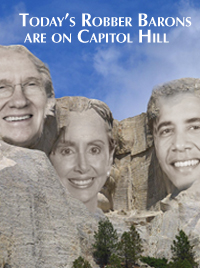| Today’s Robber Barons are on Capitol Hill |
 |
|
By Troy Senik
Thursday, April 22 2010 |
If conventional wisdom in Washington is to be believed – the beginning of a syllogism that almost never bears fruit – we are living in another Gilded Age, an epoch when rapacious captains of industry enrich themselves at the expense of “the public good” (an idea always nebulous enough to avoid empirical verification). As one Huffington Post columnist put it, “We are now at the mercy of modern Robber Barons, and if history is any judge, it is either them or us.” But the media aside, repeating a hackneyed narrative ad nauseam doesn’t make it true. The problem with the notion that men like John D. Rockefeller or Cornelius Vanderbilt pilfered the public to create obscene fortunes in the 19th century has the same flaw as today’s argument: it ignores elementary economics. Short of fraud, trade is only engaged in when both parties believe they will find themselves better off after a transaction than before – so it is not, in fact, “either them or us.” In fact, in assessing the legacy of the Robber Barons, historian Burton Folsom concluded: “The success of the market entrepreneurs of the post-Civil War era depended on their ability to serve consumers. When they started their enterprises, the United States was a second-rate power; during their lifetimes they spurred American industry to world dominance. Their accomplishments in transportation, steel, oil, and chemicals led to the unparalleled economic progress of the late 1800s, contributed to American prosperity, and prepared the way for future innovation. Along with our Founding Fathers and the World War II generation, this remarkable group of entrepreneurs has a rightful claim to being America’s greatest generation.” Before outraged liberals accidentally knock their piping hot soy chai lattes into their laps (they don’t make those post-consumer recycled cups like they used to), they should note two key words in Folsom’s diagnosis: “market entrepreneurs”. He contrasts this clique with what he calls “political entrepreneurs” – businessmen who largely acquired their lucre through their connections with government. If you’re looking for a modern analogy, this latter group is your target. For all of the hand-wringing over obscene corporate power in the age of Goldman Sachs, it bears noting that nearly every time big business takes the hammer to America, it’s the federal government that’s holding the nail. Sure, Wall Street worked itself into a lather with complex financial instruments as impenetrable as Fermat’s Last Theorem; but when they collapsed, it was Washington manning the bucket brigade (note to readers: you paid for the buckets). And yes, plenty of everyday Americans took a hit to their retirement plans because of pension investments in Chrysler or General Motors – but it was the Obama Administration that shoved those supposedly secured investors out of line in order to deliver bigger benefits for the United Auto Workers. Now, as Congress considers extensive new regulations intended to prevent another meltdown, it’s obvious that the same hands are still in the public till. The most glaring example of this is the proposed legislation’s $50 billion fund to cushion the costs of future bailouts. Because the money will come from assessments on the very firms the bill is meant to keep from bringing down the financial system, proponents argue that it’s a necessary safeguard. But by telegraphing that the debt of these “too-big-to-fail” firms has the implicit backing of the federal government, Congress would essentially turn the biggest Wall Street firms into clones of Fannie Mae and Freddie Mac – reckless institutions drunk on the taxpayer’s tab. The villains here aren’t the members of the American business class – at least not solely. It’s true enough that corporate America will exploit any opportunity for competitive advantage handed out by government. And anyone who thinks that this insight can’t be squared with support for a free-market economy should read Adam Smith’s magnum opus “The Wealth of Nations,” which praises capitalism and condemns businessmen in rough proportion. This sort of avarice is eternal. But it can only be actualized by political power. Barons can exist in a free market. Robbers can’t. Robbery requires coercion. And in a free economy, that coercion can only come from government. So are we in a new age of Robber Barons? Sure. But they’re not on Wall Street. They’re on Capitol Hill. |
Related Articles : |
























